When Ravenhill Roared - How Ulster made their Belfast home a European fortress
- Published
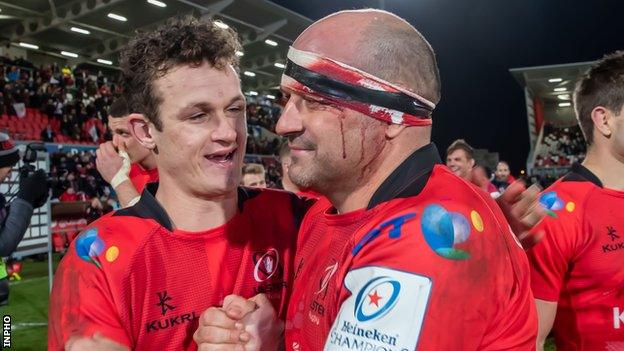
Billy Burns and Rory Best celebrate Ulster's crucial win over Racing 92 in January 2019
'The bigger they are the harder they fall', so the saying goes.
In the case of Ulster's Heineken and Champions Cup opponents, the giants of European rugby have been falling with regularity at the Irish province's Ravenhill home for many years.
The Belfast stadium has a well-established reputation as a fortress for matches in the continent's premier club competition, with many of France's star-studded teams and England's big-hitters being humbled in front of a baying crowd.
Rooted in Ulster's success in 1999, there has always been something special, something intangible, around big European encounters at Ravenhill - the build-up, anticipation and atmosphere rising a notch or two above the norm.
Transformed into a cauldron, the venue, redeveloped and re-named Kingspan Stadium in 2014, has witnessed many teams bristling with star names come out second best over the last decade and beyond.
Whether it be the traditional Friday night under the lights or Saturday afternoons, Ulster have consistently mixed it successfully with the continent's elite - just five defeats in 36 pool matches over a period of 12 years tells its own story.
In a competition where much store is put on home advantage, Ulster's record on their own patch has been the envy of other clubs with big reputations and major financial clout.
Indeed, Ulster have saved many of their best performances for the European stage, displaying an ability to raise their game for the big occasion even when their league form has been indifferent.
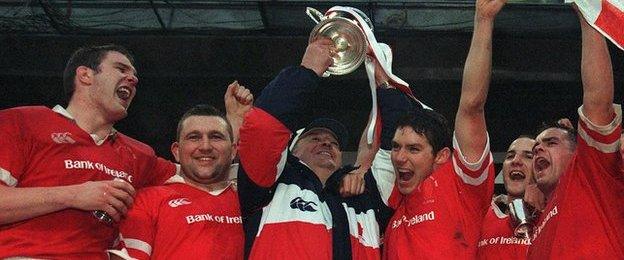
Tony McWhirter (left) celebrates as Ulster coach Harry Williams lifts the Heineken Cup in 1999
Former Ulster back row Tony McWhirter, now a BBC analyst, sums up: "I think Ulster's reputation as a formidable place to come to is acknowledged throughout Europe and is influenced by a number of factors.
"There is a lot of pride in wearing that Ulster shirt among all the players, plus the weather is often inclement which can play into their hands and unsettle the opposition. Then you have what the crowd brings with it in terms of atmosphere and vociferous backing.
"Each squad of players has set a precedent for those following in terms of what has gone before and trying to maintain that record and tradition. So many times I have seen Ulster dig deep to produce big results when they are neeed most."
French giants felled
Ulster's love affair with the European Cup began in the 1998-99 season, with that never-to-be-forgotten success - the highlights being a quarter-final win over Toulouse, the thrilling 33-27 win over Stade Francais at the semi-final stage and victory in the final over a third French team - Colomiers - at Lansdowne Road.
David Humphreys' dash down the right wing and drop-goal heroics against Stade at Ravenhill are the stuff of legend - moments that had the famous old ground rocking as never before.
The 20,000 fans crammed in that day will never forget the image of Humphreys diving over in the corner - the elation, the celebrations which followed that triumph against one of the wealthy kingpins of French rugby. It was an occasion that had everything - tension, drama and spectacle in spades.
Despite Celtic Cup and Celtic League successes in 2003 and 2006 respectively, a relative barren spell followed but five home victories from six outings in the pool stages of the 2008-09 and 2009-10 seasons indicated green shoots of recovery on the European stage.
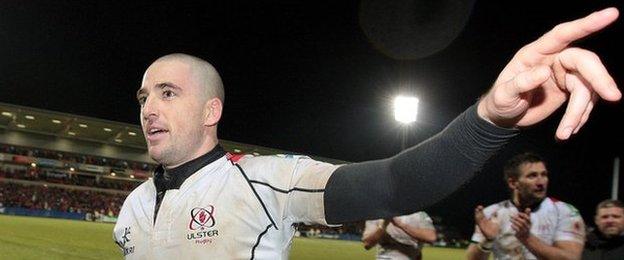
Ian Humphreys scored all nine points in Ulster's 9-6 win over Biarritz in January 2011
Humphreys stars in wins over Biarritz and Clermont
The following campaign brought a first appearance in the knockout stages for 12 years - home wins over Bath and Biarritz preceding a quarter-final defeat away to Northampton.
The highlight was a thrilling narrow 9-6 win over Biarritz, external in Belfast, with Ian Humphreys kicking three penalties to help Brian McLaughlin's side over the line against the previous season's beaten finalists.
The fly-half's match-winning penalty, executed under immense pressure with less than two minutes remaining was one of those magical memories that European competition seems to regularly throw up.
Humphreys' contribution was again to prove vital the following season - the mercurial number 10 scoring all 16 points courtesy of a try, conversion and three penalties, in a crucial 16-11 win over Clermont Auvergne.
Humphreys recalls: "The Biarritz game was not much of a spectacle - the weather was horrible but we knew we needed to win to stay in contention and in the end I managed to kick the winning points.
"The Clermont game was much more open and it's strange but I didn't really think I had a great game. It was a lovely afternoon for rugby - the sun was shining, there was a big crowd and the result went the right way for us. When you retire the big European games are the ones you miss."
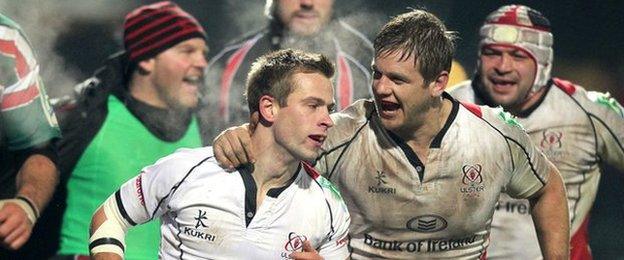
Paul Marshall scored a try in Ulster's 41-7 demolition of Leicester Tigers in January 2012
Leicester humbled
Two months later Leicester Tigers were put to the sword 41-7 - one of several heavy defeats at Ravenhill for the English Premiership side over the years - as Ulster eased their way into the last eight for the second successive season.
For the team from Welford Road it was the heaviest European defeat they had suffered for 17 years as they were mercilessly swept aside by an Ulster side for whom Ruan Pienaar starred with an impressive 21 points from the boot.
Andrew Trimble's penchant for popping up with significant scores in big games reared its head again as he provided the platform for victory with two first-half tries, Craig Gilroy and Paul Marshall also crossing the whitewash in a resounding 'statement of intent' win in January 2012.
Ulster journeyed on to the final with an away quarter-final win over Munster and a semi-final success over Edinburgh in Dublin - but came out decisively second best in the final, going down 42-14 to Leinster at Twickenham.
Despite suffering a rare home reverse at the hands of Northampton, Ulster again progressed to the knockout stages in the 2012-13 season, before going down to Saracens on the road in the quarter-finals. A 24-18 defeat by old nemesis Leinster in the Pro12 final at the RDS that term brought further disappointment.
Heroic display against Saracens
Ulster topped their European pool for the second consecutive year in 2013-14 - Kiwi coach Mark Anscombe again at the helm as the Irish province put some inconsistent Pro14 form behind them to win six matches out of six in the pool stage for the first time.
Familiar foes Leicester were again seen off at a sold-out Ravenhill, this time by a less comprehensive 22-16 margin, while Montpellier became the latest French side to be dispatched - 27-16 the score-line.
With the transformation of the soon to be re-named Kingspan Stadium complete, Ulster hosted Saracens on 5 April 2014 in a pulsating quarter-final which saw Ravenhill at its most raucous.
Ulster fans will not need reminding of Jared Payne's fifth-minute red card from referee Jerome Garces which left the home side facing a massive uphill struggle - the New Zealand native sent-off after colliding with Alex Goode when challenging for an up and under.
The sense of injustice among Ulster supporters still rankles to this day but a heroic effort followed as Ulster retained hope of victory thanks to the accuracy of Pienaar and Paddy Jackson from the tee - the pair combining to contribute five penalties.
Two Saracens tries proved enough to see the English visitors through 17-15 however - Mark McCall's men going on to lose to Toulon in the final.
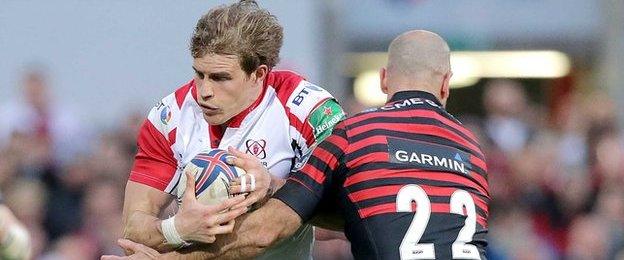
Andrew Trimble comes up against Charlie Hodgson in 14-man Ulster's quarter-final defeat by Saracens in 2014
More home successes - but no last eight
Toulon went on to inflict defeat on Ulster at Kingspan the following season and despite a home win over Scarlets and the by now ritual humbling of Leicester - this time 26-7 - Ulster failed to make the knockout phase for the first time in three attempts.
Saracens emerged 27-9 victors at Ulster's home in the first home pool match of the 2015-16 season - but this was followed by a dazzling Friday night five-try 38-0 demolition of four-time champions Toulouse in December.
The trouncing saw Toulouse fail to register a point in a European game for the first time in their long history in the competition. Oyonnax were also thrashed 56-3.
Hard-fought victories over Exeter Chiefs and Clermont Auvergne, the latter a titanic high-quality struggle, proved insufficient to ensure Ulster's passage from their group in 2016-17 - a 39-32 loss to Bordeaux Begles in Belfast coming after their hopes of progressing to the last eight had already gone.
Despite all the difficulties which marred Ulster's 'annus horribilis' of 2017-18 New Zealand-born coach Jono Gibbes led Ulster to three morale-boosting home victories over European giants Wasps, Harlequins and La Rochelle - but again it proved insufficient to make the quarter-finals.
Racing join collection of Ulster scalps
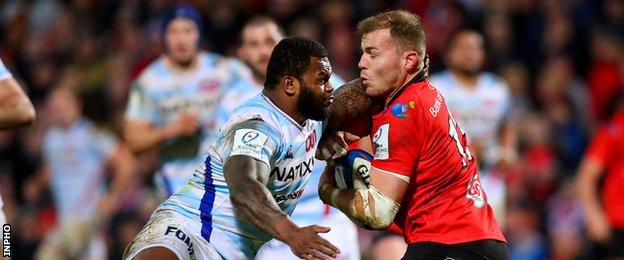
Virimi Vatakawa and Will Addison in action during Ulster's win over racing in January 2019
Dan McFarland's first season in charge was to herald a return to the knockout phase on the continental stage - with the help of home successes over Leicester, Scarlets and Racing 92.
The 26-22 triumph over Racing was particularly hard-earned - Jacob Stockdale crossing twice and Robert Baloucoune once as Ulster produced a typically gritty display to out-score their four-try visitors.
Having narrowly lost 15-12 to Leinster in the 2018 final and also ending runners-up to Saracens in 2016, Racing represented another, new major scalp for Ulster to add to their collection. Leinster proved marginally too strong in the quarter-finals though.
This season has seen another run to the knockout stages for Ulster, built on the foundations of home wins over Bath and Harlequins, either side of a key 18-13 victory over Clermont Auvergne.
John Cooney was the man pulled the strings against the Challenge Cup holders on another sizzling Friday night at Ulster Rugby headquarters - the scrum-half producing a masterful display and contributing 13 points.
Ulster dominated territory and possession throughout and Jordi Murphy's try helped them to a success which helped them book a quarter-final away to Toulouse - a fixture which has been delayed because of the Covid-19 pandemic and will now take place in September at the earliest.